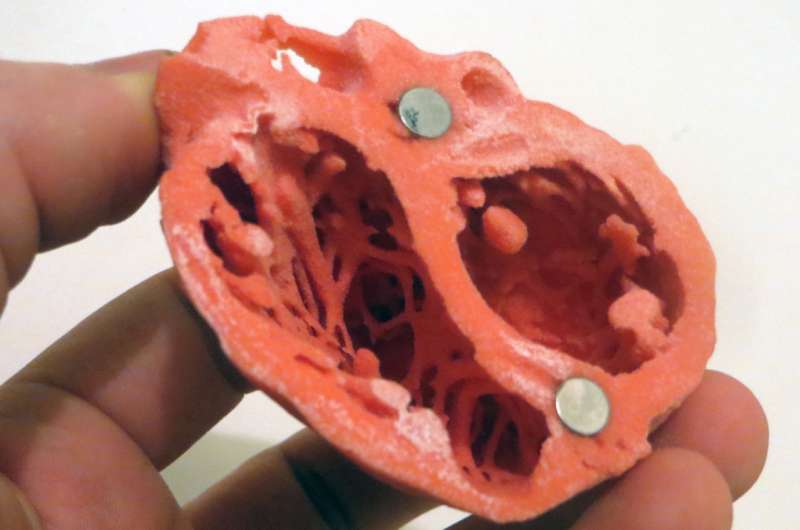This article has been reviewed according to Science X's editorial process and policies. Editors have highlighted the following attributes while ensuring the content's credibility:
fact-checked
trusted source
proofread
Colchicine fails to reduce primary outcomes in COP-AF trial but encouraging signals found

Colchicine does not significantly reduce perioperative atrial fibrillation (AF) or myocardial injury after non-cardiac surgery (MINS) in patients undergoing major non-cardiac thoracic surgery, according to late breaking research presented in a Hot Line session today at ESC Congress 2023.
Perioperative AF occurs in approximately 10% of patients after major thoracic surgery, while MINS has an incidence of about 20% in the same patient population. Patients with perioperative AF and MINS have a poor prognosis. High levels of inflammatory biomarkers have been associated with an increased risk of perioperative AF and MINS.
Anti-inflammatory treatment therefore has the potential to reduce the incidence of these two prognostically important complications. Colchicine is an inexpensive drug with anti-inflammatory effects. Small randomized trials have suggested that in patients undergoing cardiac surgery, low-dose colchicine reduces the risk of perioperative AF. Two large randomized trials found that low-dose colchicine significantly reduced the incidence of major cardiovascular outcomes in patients with coronary artery disease.
The COP-AF trial tested the hypothesis that colchicine reduces the incidence of clinically important perioperative AF and MINS in patients undergoing major non-cardiac thoracic surgery. The trial enrolled patients aged 55 years or older who were undergoing major non-cardiac thoracic surgery.
Participants were randomly assigned in a 1:1 ratio to receive oral colchicine 0.5mg twice daily or matching placebo, starting within four hours before surgery and for a total duration of 10 days. Two co-primary outcomes were assessed during 14 days of follow up: 1) clinically important perioperative AF (i.e., AF needing medical treatment or AF leading to heart failure, hypotension or angina) and 2) MINS (i.e., myocardial infarction or any postoperative troponin elevation deemed to be of ischemic origin).
The study included 3,209 patients from 45 sites in 11 countries. The mean age was 68 years and 48.4% were women. Clinically important AF developed in 103 of 1,608 (6.4%) patients assigned to colchicine and 120 of 1,601 (7.5%) patients assigned to placebo, for a hazard ratio (HR) of 0.85 (95% confidence interval [CI] 0.65 to 1.10) and absolute risk reduction (ARR) of 1.1% (95% CI -0.7 to 2.8, p=0.22). MINS occurred in 295 (18.3%) patients assigned to colchicine and 325 (20.3%) patients assigned to placebo, HR 0.89 (95% CI 0.76 to 1.05) and ARR 2.0% (95% CI -0.8 to 4.7, p=0.16).
There were no significant differences between treatment groups in key secondary outcomes, including the composite of all-cause mortality, nonfatal MINS and nonfatal stroke, HR 0.88 (95% CI 0.75 to 1.03); the composite of all-cause mortality, nonfatal myocardial infarction (MI) and nonfatal stroke, HR 0.67 (95% CI 0.39 to 1.17); MINS not fulfilling the fourth universal definition of MI, HR 0.90 (95% CI 0.76 to 1.06); and MI, HR 0.86 (95% CI 0.41 to 1.81).
In post-hoc analyses, the composite outcome of clinically important perioperative AF or MINS occurred in 360 (22.4%) patients in the colchicine group and in 415 (25.9%) patients in the placebo group (HR 0.84; 95% CI 0.73 to 0.97).
The composite outcome of vascular mortality, nonfatal MINS, nonfatal stroke or clinically important perioperative AF occurred in 364 (22.6%) patients in the colchicine group versus 422 (26.4%) in the placebo group (HR 0.83; 95% CI, 0.72 to 0.96). Six patients had a stroke, 1 (0.1%) in the colchicine group and 5 (0.3%) in the placebo group (p=0.12).
From a safety perspective, the composite outcome of sepsis or infection occurred in 103 (6.4%) patients in the colchicine group and 83 (5.2%) patients in the placebo group (HR 1.24; 95% CI 0.93 to 1.66). Colchicine increased the incidence of non-infectious diarrhea, 134 (8.3%) versus 38 (2.4%) patients, HR 3.64 (95% CI 2.54 to 5.22).
No treatment was required in 66 (38.4%) cases of diarrhea, 15 (8.7%) patients needed intravenous hydration, 2 (1.2%) received antibiotics, and 1 (0.7%) patient required readmission for diarrhea. In the colchicine group, the median (interquartile range) length of stay was 5 (4-7) days in patients with diarrhea and 5 (3-7) days in those without diarrhea.
Principal investigator Dr. David Conen of the Population Health Research Institute, Hamilton, Canada said, "Colchicine did not significantly reduce the incidence of the co-primary outcomes of clinically important perioperative AF or MINS. Colchicine increased the risk of non-infectious diarrhea, but our data suggest that these episodes were temporary and benign."
"Despite these findings, several results provide an encouraging signal of benefit for colchicine to reduce the incidence of adverse cardiovascular outcomes in patients undergoing major non-cardiac thoracic surgery. Future trials should further investigate the role of colchicine in the prevention of these events in patients undergoing surgery."





















